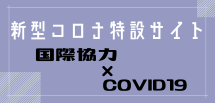IDJ-ENGLISH "A Caring" Approach for Medical Equipment Provision
Special Feature Stories: Japan’s Health and Medical Cooperation
"A Caring" Approach for Medical Equipment Provision
Caring from a "Post-Grant" Perspective, and the Voices of Nurses and Health-workers
As the Japanese government and JICA has announced that they will expand their medical cooperation projects, the International Development Journal has tried to outline how Japanese-style-aid can contribute in healthcare and medical cooperation projects through our January edition, 2021. What interested me the most was that many of the interviewers seems to describe Japanese aid as “Caring".
Japan’s technical aid does take pride in its human-to-human approach. Japanese experts have continuously been dispersed to local sites where they not only work, but also live together with the people for months and years. By becoming a part of the community, they work to identify the problems, and together with the people, they construct a solution that will fit into the community.
But Japan’s aid is not only about human-to-human technical assistance. For Japan to advocate itself as “Caring”, the concept also needs to be demonstrated in equipment procurement and infrastructure projects.
Who to "Care” for?
The principle of Japanese ODA is request based. This means that the initiative of the project lies with the recipient. The idea is that the Japanese government will not force their own priorities through the project, respecting the ownership of the recipient.
The requests for equipment and infrastructure, are mostly made by the recipient countries’ governments. The government is, after all, the responsible body for pursuing the countries’ medium-to long-term interests. So yes, the Japanese ODA “cares” for the recipient government’s needs.
However, there are critiques that point out that the smaller voices are not always cared for. A medical equipment dealer, who has been involved in many Japanese ODA projects in East Africa points out that in the projects where he had provided medical equipment, the voices of the nurses and health workers, who actually handle the equipment, are often left out.
“These projects tend to not last very long” he says, explaining that there was equipment that did not even last three months.
“If an ODA procured equipment malfunctions, people often point to the nurses as being guilty. This is partly true, in a lot of cases the equipment is damaged during the cleaning process, which is mostly done by the nurses. However, it is crude to only point to them. It could be because of the poor water quality from the rusted pipes that damages the delicate pieces. It could be the badly composed rooms that interferes with the cleaning and storing process. It could be the shortage of nurses. What I mean to say is, it might not only be the nurse’s fault. If you talk with them personally, they can tell you why they might have damaged the equipment, and try to fix that problem first. But not one really does “
Why are the nurses not involved? The answer may be, that it would be too time and effort consuming. The nurses may not speak English. They may not be used to giving opinions. In many countries, the social status of nurses and health workers is still very low and they are rarely asked for their opinions even by the doctors or management staff of their hospitals, let alone foreign donors. But, by trying to encourage wide participation and “caring” for the many voices on the ground, the risk of equipment damage can be reduced, and also help the social statuses of nurses and health workers.
Post-Project Point of view
Interviewing a doctor at a hospital where endoscopes were provided through Japanese ODA in Africa, it has also come to our attention that a post-grant-perspective is important when talking about “caring”.
"Thanks to the provided endoscopes, the hospital is now able to identify cancers, a growing problem in the region. However, that is all we can do, as there are not enough doctors with surgical skills or the medical facilities. If the patient has money, they may go abroad for treatment. But most people do not, so they have no choice but to wait and die."
As the overall medical systems are still fragile in many developing countries, the effect of a one-time provision of equipment would be limited. As the director of the Medical Corporation KNI’s Overseas Division, Ms. Mihoko Nakayama points out that it is important to provide packaged support. Training on the proper use of the equipment of course, and also training and additional provisions based on newly identified needs will be vital in advancing the medical system as a whole.
In Vietnam, JICA has continuously worked on upgrading the medical system of the country. They not only upgraded the three core hospitals, Bach Mai in the northern region, Fue in the middle, and Chowlai of the south, but they have also strengthened the links between them and the regional hospitals and health clinics. This system was achieved not only with one project but through a mix of projects, equipment procurement, training and facility upgrading over a long period of time. With this upgraded system, Vietnam is said to have been successful in combating the COVID-19 pandemic and minimizing the damage.
Encouraging Existing Experts
In being “caring”, it does not mean to just give whatever is requested. It is important for the donor’s side to have medical experts to consult. However, according to the medical equipment dealer introduced above, there are often no Japanese medical or healthcare specialists involved throughout the projects.
"Without experts from the donor’s side to scrutinize the plans, the effects cannot be guaranteed. There is even the risk of corruption"
Of course, trying to encourage more people to work abroad is important but, as a Japanese member of the WHO comments, the number of Japanese medical specialists who are willing to leave their stable lives in Japan and dedicate themselves to improving the medical situation in developing countries is limited.
So at the same time as trying to increase the number of medical experts in the field, asking the already existing human resources on the ground would be effective for dealing with the situation in a timely manner. There are indeed Japanese medical experts actively working toward medical improvement in developing countries, and we have introduced some through this edition. ODA projects should actively include such experts in the future. In particular the Medical Attaches of Japanese Embassies can also play vital roles. Until now, the Medical Attaches have been mainly tasked with the health care of the Embassies staff and their families, and they have not been expected to get deeply involved in projects.
But now things have started to change. Together with the announcement of the African Health Initiative by the Japanese government, the Medical Attaches are now encouraged to get involved in ODA projects. It is hoped that from now on the Medical Attaches not only of the Africa-based Embassies but also around the world, will play active roles as advisors.
Caring for..
The Japanese government has long promoted the principles and international initiatives such as the Universal Health Coverage (UHC) and the concept of "Human Security." On the other hand, it has been pointed out that the amount of cash input has been moderate.
The Japanese government seems to be trying to give its self a new name, as a big contributor and has announced large-scale schemes, such as the “COVID-19 Crisis Response Emergency Support Loan”, a two-year entity providing a total of 500 billion yen to developing countries dealing with the COVID-19 pandemic. Prime Minister Suga himself has also pledged at the United Nations General Assembly that Japan will implement medical assistance worth over 170 billion yen. JICA, too, announced their aim to implement over 100 projects in a wide range of countries to upgrade their medical capacities.
However, too much emphasis on the quantity can be damaging to the quality of each project. A “caring” project is time and effort consuming, but when there are so many other donors that emphasize quantity, the caring, quality approach which does not only respond to the immediate COVID-19 needs, but also contributes to upgrading the medical system itself, may differentiate Japan as being a unique and effective donor.
For this, the Japanese government also needs to keep the number of those available for project management in mind, particularly those at JICA offices and the Embassies. These people on the sites are the ones who would be tasked to plan, implement, and follow the projects up. The government will have to balance how many projects can realistically be done without undermining the quality. With the COVID-19 pandemic, some regions may have strict restrictions on human movement, making project management even harder. A “caring” project can only be implemented by “caring” for the capacity of the implementors as well. (Natsu Kimura)
“International Development Journal” January edition, 2021
*****以下、日本語原文*****
特集:日本の保健医療協力 機材供与で示す「寄り添う」姿勢
“供与後”の視点を持った計画づくりを
看護師やヘルスワーカーの声にも光を当てる
誰に「寄り添う」のか
今回の特集取材では、「日本の保健医療協力の強みとは何か」をそれぞれに問い掛けてきた。そしてその中で、繰り返し強調されてきたのが「寄り添う」という言葉だった。しかし、機材供与などのハード案件で具体的にはどういう姿勢や行動を指すのだろうか。この言葉が示す意味を再考したい。
再考する上でまず思い浮かんだのが、「日本の政府開発援助(ODA)が原則とする『要請ベース』は『寄り添う』と同義か」という点である。現地の価値観や文化などを無視して自国の法制度や社会システムを導入したり、ドナー自身の価値観に基づき形成したプロジェクトを相手国に提示したりする、いわゆる“上から目線”のアプローチと要請ベースは、たしかに異なると言える。ODA案件の要請は一部のスキームを除いてカウンターパートである政府機関から受けることが多く、国全体のバランスや中長期の成長を考える政府の声を聞き、彼らが立てた目標の実現を支えることの意義は大きい。
その一方で、「現場の声を拾いきれていない」という指摘も聞かれる。東アフリカにある日本の医療機材メーカーの代理店で長年働き、日本のODA事業に数多く携わってきたA氏も同様の指摘をしている。A氏が特に感じるのは、内視鏡などの機材供与において、機材の洗浄や維持管理を行う現場の看護師やヘルスワーカーらの声が案件の計画段階で抜け落ちていることだ。そうした案件では、現場のミスハンドリングなどにより短期間で機材が故障してしまうケースが多いという。「看護師らによくよく話を聞くと、機材の洗浄を行う水道の水圧や水質が不安定なことや、洗浄室が狭すぎること、そもそも看護師の人数が足りず全工程を丁寧にこなすキャパシティがないことなどがミスハンドリングを誘発する要因になっていた。こうした問題点は、現場で作業している人でないと気付きにくい」とA氏は語る。
多くの開発途上国では、看護師やヘルスワーカーの社会的地位は低く、機材供与などの計画形成に意見を求められることは少ない。しかし、そうした見過ごされがちな現場にも寄り添い、小さな声を拾い上げ、積極的に計画に組み込んでいくことは、協力の成果を高めることにつながる。看護師やヘルスワーカーなどの社会的地位の向上につながっていくことも期待できる。日本としても、現地での日本の医療機器への信頼が高まり、将来的には輸出や企業の進出にもつながっていく可能性がある。日本のODAでは今後、病院建設や医療機器の供与といった協力が拡充される予定だ。そうした協力が感染症対策に限らずさまざまな波及効果を生み出していけるかは、いかに多くの人に寄り添う視点を持つかがカギを握るのかもしれない。
人材育成とのパッケージで
波及効果の高い機材供与支援を行う上では、多様な声を取り入れることに加え、“供与後”の視点を持つことも重要だ。医療法人社団 KNIの海外事業部部長である中山美穂子氏は、「機材が継続的に活用されるよう、医療技術やマネジメントなどの人材育成も組み合わせたパッケージ型で支援していくことが大切だ」と語る。
また、日本のODAにより内視鏡が整備されたアフリカの病院に務めるある医師は、「内視鏡のおかげで患者の癌などを発見できるようになった。しかし、発見できたとしても外科技術や手術設備はないので、結局、治療ができない。患者はお金があれば海外へ手術を受けに行くことができるが、そんな高額を支払える人はほとんどいない。癌を発見できても彼らは死ぬのを待つしかない」と悲痛な思いを打ち明ける。こうしたケースには、機材供与に合わせて外科手術のできる人材の育成支援を日本の大学や病院と連携して実施していくのがいいだろう。こうして次なる協力事業を継続的に形成していくことで、機材自体のフォローアップにもなる。
このように多様な協力を重ねて大きな開発効果を生み出す事例は、すでにある。本誌でも紹介しているベトナムのバックマイ、フエ、チョウライでの病院協力だ。病院施設整備や機材供与という単発の事業で終わらせず、整備されたこれらの地域の中核病院と地方病院との連携を促して研修などの人材育成も実施し、ベトナム全土の保健医療システムそのものの改善に貢献した。こうした“事業群的”アプローチを今後も積極的に展開していくべきだろう。
医務官など既存の人材を生かす
“事業群的”アプローチを推進していく上で重要となるのは、ドナー側に現状に対応した提案やアドバイスができる人材の存在だ。しかしA氏によると、日本のODAの機材供与の案件においては、現場視察や協議の場に日本側の保健医療の専門家がいないことが多いという。「要請や計画を精査する専門家がいなければ、効果が限定的になる恐れがあるだけではなく、汚職や不正が生じる懸念もある」とA氏は訴える。
本特集にも登場しているとおり、途上国の医療現場には精力的に活動する日本人がいる。今後のODAの案件形成ではこのような人材との積極的な連携が望ましい。ただ、世界保健機関(WHO)の瀬戸屋雄太郎氏が指摘するように、日本での安定した生活を離れ、語学や生活事情に不安のある途上国の医療現場の向上に尽力しようという日本の医療関係者の数は、現時点では決して多いとは言えない。
では、これまで主に在外公館の関係者の体調・健康管理を任務としていた在外公館の医務官など、既存の人材を積極的に医療案件に関与させてはどうか。アフリカにおいてはアフリカ健康構想の発表に後押しされ、長井俊治氏(21~24ページ)のように積極的に保健医療分野のODA案件や日本・エチオピアの医療研修案件に携わる医務官が現れている。今後は、アフリカに限らず世界各地に派遣されている医務官が在外公館と現地政府や医療現場とのつなぎ役、そして案件形成のアドバイザーとしての活躍できるような基盤づくりを整えていくことも一案だろう。
日本のリソースの拡充も
これまで日本の保健医療協力は、ユニバーサル・ヘルス・カバレッジ(UHC)や「人間の安全保障」の推進といった理念の普及において国際的なイニシアチブを発揮してきた。その一方で、ODA支出額といった金額的な貢献度の低さが指摘されている。そうした中において、「2年間で5,000億円」の緊急支援円借款、「100カ所」の病院協力、菅首相が国連総会で表明した医療・保健分野での「1,700億円超」の対外支援といった数値目標は、国内外に一定のインパクトを与えているだろう。
とはいえ、数字に固執して、日本の強みとして評価されている「寄り添う」姿勢が抜け落ちてしまっては本末転倒だ。一つ一つの案件で幅広い関係者との協議、実施状況の確認、フォローアップや派生ニーズの調査などをしっかりと行ってこそ、“上から目線”や“量的貢献”での支援を行う他のドナーとの差別化が図れるだろう。“量”以上に、中長期的な視点に立った“質”的アプローチを追求していくことを日本には期待したい。
ただ、“量”と“質”、いずれにしても力を入れていく際にはJICAや開発コンサルタント、企業、医療関係者といったODAに携わる人材リソースやキャパシティなどの拡充にも配慮が求められる。特に現地で案件を形成・実施・フォローアップするJICAの現地事務所や在外公館の職員数は限られている。感染・社会状況によっては今後も遠隔での案件運営を継続せざるをえない国・地域もあるだろう。そうした状況で数値目標の達成を主目的に置いても、“雑”な案件が多発することになりかねない。
開発コンサルタントや専門家らが現地で人々と案件を共創する技術協力や、人財のネットワークを構築する研修事業などを展開する日本ODAの基盤こそが「寄り添う」姿勢だと言える。その姿勢が人の生命を守る医療器材供与の協力でこそ発揮されることが期待されている。
(本誌編集部・木村 夏)
『国際開発ジャーナル』2021年1月号掲載記事


